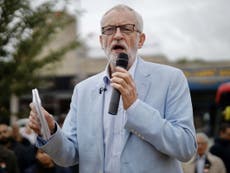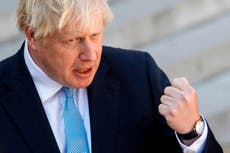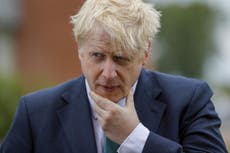Some home truths about the relationship between the UK and Ireland
The political classes of Britain would do well to learn some more about its nearest neighbour, particularly with a way still to go when it comes to Brexit negotiations

I moved from Ireland to the UK, back in autumn 2010, as the Irish economy was in tatters; the property bubble had burst and the banks were facing disaster. Representatives from the European Commission, the International Monetary Fund and the European Central Bank (the Troika) were traipsing around the streets of Dublin enveloped in smart Aquascutum raincoats, battling the elements while trying to cajole the Irish government into the “Economic Adjustment Programme for Ireland”. Otherwise known as the “bailout”.
It was the height of the eurozone crisis and Ireland was high on the global news agenda. As a recently arrived Irish business journalist, I promptly found myself back in my hometown – just weeks after I had left – to cover the negotiations between the Irish government and the Troika. Would the then-taoiseach Brian Cowen and his finance minister, the late Brian Lenihan, sign up to the terms set out by these seemingly nameless, faceless apparitions sweeping around the streets of Dublin? Or would Ireland bound impetuously over the ominous cliff edge everyone was talking about? The implications for the global financial system were huge.
At the time, it didn’t occur to me to consider the significance of Ireland featuring in the news in the UK.
I had arrived in London a green and likely naive young journalist; inexperienced in the way of the world when it came to Anglo-Irish relations. I was unaware that the ties between our two countries were not so much intertwined as rather very much one-way.
Savita Halappanavar died seven years ago this month after medical staff denied her request for an abortion following an incomplete miscarriage. That particular night in 2012 I was whiling away a seemingly-interminable night shift on the newsdesk, hunting around social media for potential news and maybe a little bit of an update from friends back in Ireland. This was how I first saw the news of Ms Halappanavar’s death in a hospital in the western city of Galway.
During a handover phone call with a senior colleague due to takeover when my shift ended, I suggested that we deploy our Ireland-based correspondent from Belfast to Galway immediately in order to cover the story. I was told in no uncertain terms that I should do no such thing. That this was not a big story and that “no one over here cares”. The next day, once I had woken up from a few hours sleep, I discovered that the correspondent had been sent to cover the story – and that there had been consternation in the newsroom over the fact he was not in position in Galway in time... so we could “only report from Dublin, not from the scene”.
Ms Halappanavar's tragic death proved to be a tipping point in Irish attitudes towards abortion and the role of religion in our supposedly secular society. On 25 May 2018, the Irish government held a referendum on the controversial Eighth Amendment of the Irish constitution which gave the life of the unborn child equal status to that of the life of the mother. The amendment was repealed by an overwhelming 66.4 per cent from a turnout of 64.1 per cent – with all but one constituency in the country voting yes to repeal.
News coverage of the “Repeal the 8th” referendum in Ireland was global. It was a truly historic moment with the people of Ireland showing the world who they are. Following just three years after Ireland became the first state to legalise same sex marriage by a popular vote, the Irish had cast off the age-old stereotype of the staunchly Catholic drunken writers and dreamers, who keep pigs in the parlour and a pint of Guinness in one hand at all times and who would never go against the teachings of their parish priest.
From an Irish perspective, the UK is our closest neighbour in so many ways: geographically, linguistically, economically. But overall, Ireland’s knowledge and understanding of the British far exceeds that of Brits about the Irish.
In school, I learned about the history of Ireland, from the Celts to the founding of the Republic. Like many here in the United Kingdom, I learned the history of the Europeans – the patronage of the Medicis and the voyages of Columbus, Cortes and Vasco da Gama. But I also learned in great detail about Great Britain and its empire as well as the connection between the UK and Ireland – detail that is not replicated in the history curriculum here it would seem.
I learned about the potato blight that struck Europe in 1845. At the time, potatoes were pretty much the only source of food for the majority of the Irish population. As a result, famine struck. The Great Famine (as it is known in Ireland) lasted from 1845 to 1849. Between death and emigration the Irish population fell by three million. At the time, Ireland produced more than enough food in other crops and livestock – but that was all exported to Great Britain and further afield. The first many people in Britain had ever heard of the extent of the Famine was in an episode of Victoria on ITV in October 2017.
Watching the ongoing back and forth between the governments in London and Dublin about Brexit, the ignorance of many Brits in relation to the Irish psyche and the country’s overwhelming commitment to the European Union project has been equal parts amusing and depressing. In January, then-presenter of BBC’s Today programme John Humphrys caused wry smiles across the Republic when he asked Irish minister Helen McEntee why Ireland didn’t just quit the EU and rejoin the UK.
Boris Johnson and a great deal of British politicians would do well to learn more about their neighbours. When it comes to recent referendums, Irish society has shown itself to be very much of one mind on a lot of issues. Irish politicians understand what their constituents want and a hard border on the island of Ireland is not one of them. The Irish population overwhelmingly love the European Union and, while divided about plenty of issues, in that regard, they are not for turning.





Join our commenting forum
Join thought-provoking conversations, follow other Independent readers and see their replies